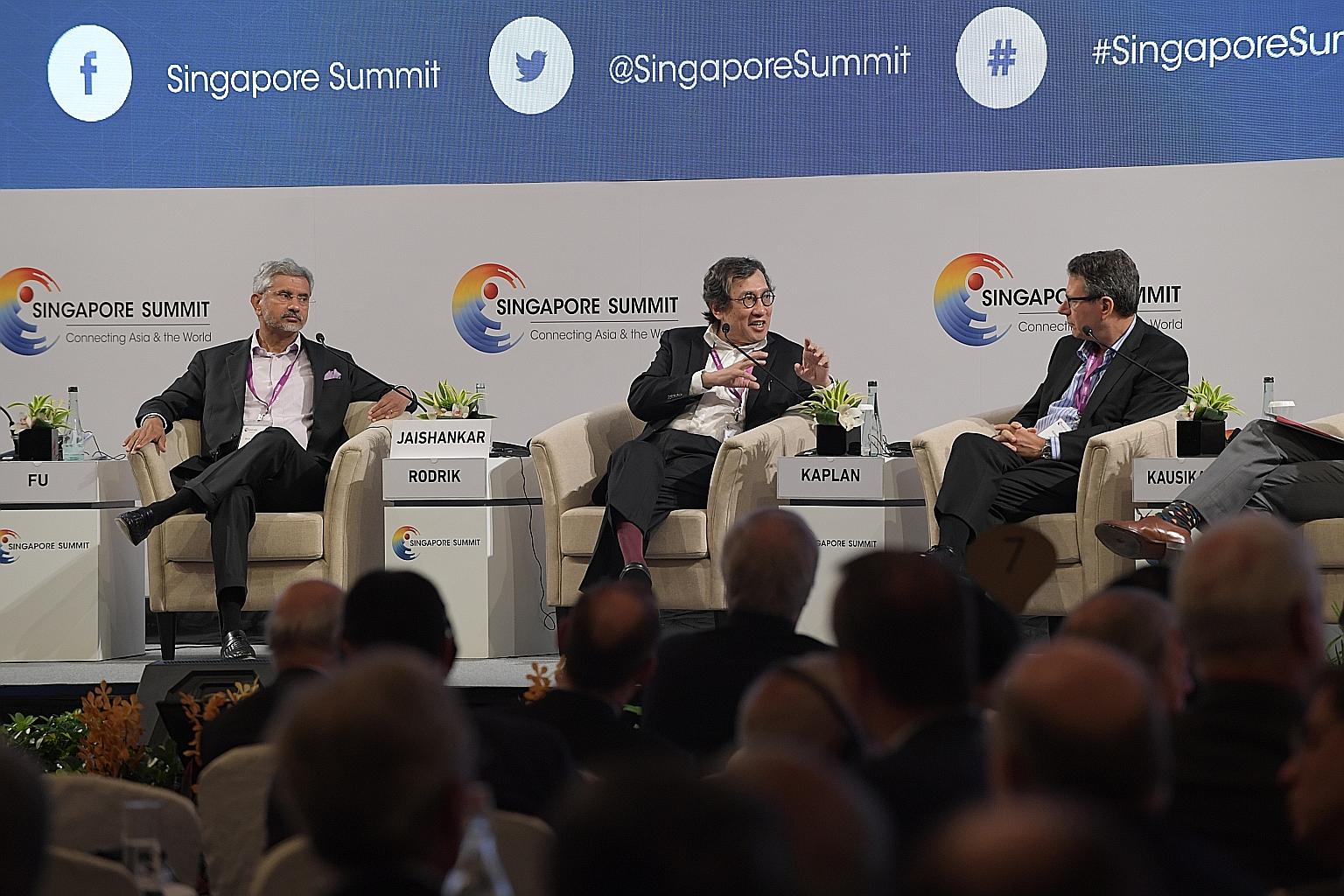US, China must try to co-exist in multipolar world, say analysts
Sign up now: Get ST's newsletters delivered to your inbox

At the Singapore Summit Plenary Session yesterday were (from left) Dr. S Jaishankar, president of global corporate affairs at Tata Sons; Mr Bilahari Kausikan, chairman of the Middle East Institute, National University of Singapore; and Mr Robert D. Kaplan, senior adviser of Eurasia Group.
ST PHOTO: ALPHONSUS CHERN
Tensions between the US and China will persist for years to come, and the ongoing trade war is but a manifestation of the testy ties between the two major powers.
While the US has not quite internalised how to cope with an increasingly assertive China, and Beijing continues to cause unease as it moves ahead with its vision of a new world order, a peaceful co-existence of some kind will need to be forged in a new multipolar world, said top thinkers and business leaders at a forum yesterday.
South-east Asian nations, as China's smaller neighbours, will also have to navigate their way around the new power dynamics, including growing Chinese military might and a longstanding US presence that may be diminished.
"We built the world economy under false premises, that different countries would start looking like the US or the West and there would be one kind of economic model. China is not playing this game and for good reason," said Professor Dani Rodrik, Ford Foundation Professor of International Political Economy at Harvard's John F. Kennedy School of Government. He was speaking at the annual Singapore Summit by Temasek Foundation Connects.
China has managed its own economy well for the last 40 years. "There has to be an accommodation that the West understands China has its own model. And China needs to understand it's been free-riding on the system created by the US," he said.
Former foreign minister George Yeo described China's rise as "like another sun entering the solar system, changing the gravitational pull for everybody".
"There are dangers but also opportunities for small countries like Singapore," said Mr Yeo, the chairman of Kerry Logistics Network.
Even if a trade war erupts, China has been down the bumpy road before, said Mr Neil Shen, who co-founded Chinese online travel firm Ctrip.com, and now runs venture capital firm Sequoia Capital China.
"But investors who look at China haven't changed. Urbanisation will continue, consumption will continue to grow," he said. There might be bright spots for China in a trade war too, as it could spur deeper development of its tech sector.
A consequence of a trade war will also see China giving a bigger push to its Belt and Road Initiative (BRI), as the country seeks out alternatives, said Prof Rodrik.
Concerns have been raised about that ambitious plan to link as many as 68 countries through a series of land and sea corridors, including from some at the forum yesterday.
Mr Fu Chengyu, former chairman of Chinese oil and gas firm Sinopec Group, argued that China had not adequately communicated the inclusivity of the BRI initiative, which has led to the perception of the East Asian giant pushing its own agenda of dominance.
"China wants the BRI to be a global BRI, but it's not up to China. Some countries won't participate because they are suspicious of China's interests," said Mr Fu.
One of the detractors is India, whose former foreign secretary S. Jaishankar said his country was not consulted about the BRI. Categorising China-India ties as "difficult", Dr Jaishankar, who is now president of global corporate affairs at Tata Sons, said: "We have grappled in the last 30 years to stabilise and find common ground."


